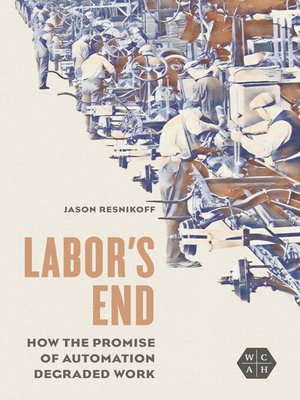Labor's End
ebook ∣ How the Promise of Automation Degraded Work · Working Class in American History
By Jason Resnikoff

Sign up to save your library
With an OverDrive account, you can save your favorite libraries for at-a-glance information about availability. Find out more about OverDrive accounts.
Find this title in Libby, the library reading app by OverDrive.



Search for a digital library with this title
Title found at these libraries:
| Library Name | Distance |
|---|---|
| Loading... |
A forceful intellectual history, Labor's End challenges entrenched assumptions about automation's transformation of the American workplace.
|Acknowledgments vii
Introduction 1
1. "The Machine Tells the Body How to Work": "Automation" and the Postwar Automobile Industry 15
2. The Electronic Brain's Tired Hands: Automation, the Digital Computer, and the Degradation of Clerical Work 39
3. The Liberation of the Leisure Class: Debating Freedom and Work in the 1950s and Early 1960s 64
4. Anticipating Oblivion: The Automation Discourse, Federal Policy, and Collective Bargaining 89
5. Machines of Loving Grace: The New Left Turns Away from Work 114
6. Slaves in Tomorrowland: The Degradation of Domestic Labor and Reproduction 136
7. Where Have All the Robots Gone? From Automation to Humanization 160
Conclusion 187
Notes 193
Bibliography 221
Index 241
|"The history recounted in Labor's End helps arm us to counter fallacious reasoning about automation and advocate for shifting the workplace toward greater worker power, dignity, and prosperity. Resnikoff's probing analysis directs our gaze away from the "shiny objects" of new technology and redirects it to where it belongs — on workers." —Catalyst"Resnikoff's forceful and coherent argument reveals that automation was not a technological process but an ideology which equated freedom with freedom from work and downplayed the workplace as a site of politics. As he convincingly shows, automation largely did not lead to a reduction in labor but rather to speedup, work intensification, and the degradation of labor, creating a huge chasm between the grandiose claims made about an automated future and the lived reality of workers."—Joshua Freeman, author of Behemoth: A History of the Factory and the Making of the Modern World
"Labor's End not only shows how the automation discourse was and is mystifying but also demonstrates the political consequences of its adoption on the Right and the Left. There is no technological fix for the political problems of work, Resnikoff reminds us. . . . Labor's End will be seen by future historians as a book that freshly reinterpreted the past to inform the politics of the present." —H-Sci-Med-Tech
|Jason Resnikoff is a lecturer in the Department of History at Columbia University.







